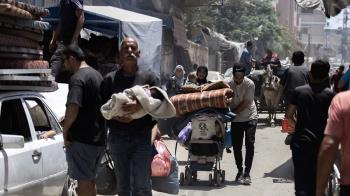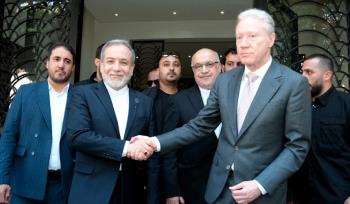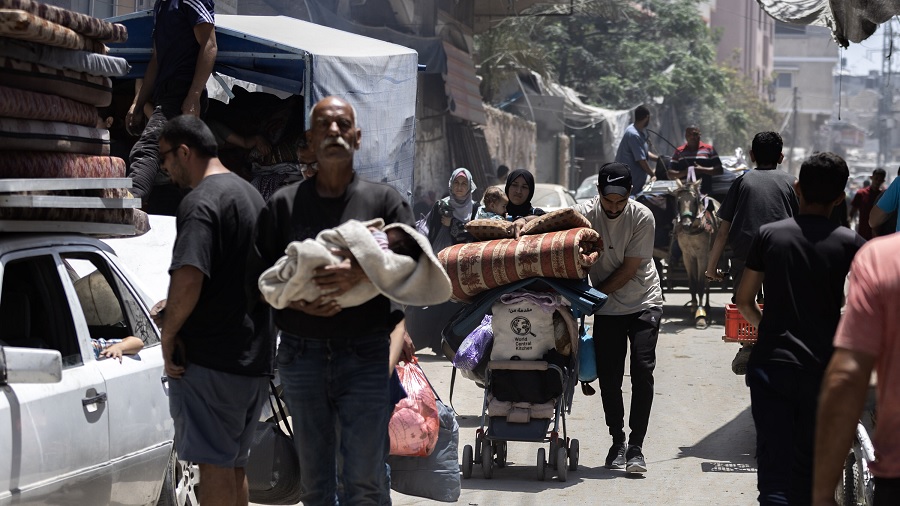Alwaght- These days Gaza situation has gone beyond a crisis. UNRWA in a statement earlier last month said that the humanitarian crisis in the coastal enclave has gone "beyond imagination." Olga Cheryuko, a spokesperson for the United Nations Office for the Coordination of Humanitarian Affairs, had earlier emphasized in a statement that the situation in the Gaza Strip is "much worse than a disaster and that the warehouses are empty of food. Given this state of crisis, why have Western countries not yet taken practical action to stop Israel's crimes in Gaza?"
In this report, by learning from the failure and fall of the apartheid regime in South Africa, we seek to answer the question of what legal and international work the West can do to stop the crimes of the Israeli regime in Gaza?
Role of international sanctions in collapse of apartheid regime on South Africa
Many analysts agree that international sanctions are one of the tools that can be used to check the Israeli crimes in Gaza. Use of international sanctions as a tool for political pressure has a long and complicated history. One of the most important and frequently used examples of them was the global campaign against the apartheid regime in South Africa. The boycott of the apartheid regime in South Africa was a concerted effort over decades that ultimately contributed to the collapse of the regime. Today, similar calls are being made for an international boycott of Israel. At the same time, could the same tools that isolated and pushed down South Africa during apartheid period be used against Israel again?
It should be noted that the sanctions were not the only reason for the fall of apartheid, but they were a powerful factor in weakening the regime.
Nelson Mandela, the leader of the African National Congress (ANC) who led the fight against apartheid left a prominent remark: "Sanctions help destroy apartheid." This remark showed that sanctions served as a pressure necessary for collapse of apartheid, though not sufficient. During apartheid, South Africa faced waves of concerted international sanctions which over time turned binding. The UN initiated a voluntary arms embargo against South Africa in 1963 (Security Council Resolution 181), which became mandatory in 1977 (UN Security Council Resolution 418). Although Western powers initially opposed the embargo, countries such as the US and the Britain eventually restricted their military exports to South Africa and enforced the embargo.
How did sanctions ground apartheid?
In general, sanctions and divestment in South Africa played as a powerful instrument against the country and the UN General Assembly in 1962 demanded avoiding economic partnership with South Africa apartheid regime.
Over time, trade embargoes, capital escape, and popular divestment campaigns, particularly in the 1980s, severely crippled the South African economy and brought the country to its knees.
In addition to economic and military sanctions, cultural and sporting sanctions were also instrumental in bringing South Africa’s apartheid to a standstill. The was banned from the Olympic Games from 1964 and faced widespread global cultural isolation.
The UN’s call for an oil embargo against South Africa in 1987 also put further pressure on the country. Meanwhile, the 1973 UN Convention on Apartheid provided the legal basis for international condemnation and action, and in the early 1990s, under increasing economic and diplomatic pressure, the South African leadership entered into negotiations that dismantled apartheid and launched a democratic transition.
Can concerted sanctions be imposed on Israel?
Although Israeli war on Palestine is historically and dynamically distinctive from the South Africa apartheid, many Israeli actions against the Palestinians both in Gaza and the West Bank are way more inhumane that those of apartheid regime of South Africa, to an extent that countries including staunch backers of Israel like the US, Britain, and Canada declared sanctions against people and organizations in Israel for their illegal actions including settlement construction.
Some trade restrictions against Israel are also already in place, with the European Union considering canceling its €42.6 billion ($48.3 billion) trade deal with Tel Aviv and considering options to suspend preferential trade or ban imports of goods produced in Israeli settlements in the West Bank.
As for arms embargoes, given the US veto power in the Security Council and Washington’s full-throated support for Tel Aviv’s crimes, a UN arms embargo on Israel seems unlikely, but some countries are taking unilateral steps. For example, France has banned Israeli military companies from attending arms trade fairs in 2024, and other European countries, including Britain, are preparing to impose sanctions and some arms restrictions on Israeli military companies.
Political challenges against judicial measures
Legal actions are also another instrument that can target Israeli regime for its Gaza crimes within a global alliance. Over the past year, as the Gaza war raged on, two cases were pursued against Tel Aviv one with the International Criminal Court (ICC) and the other with the International Court of Justice (ICJ). ICC, as a result, issued arrest warrant to the Israeli Prime Minister Benjamin Netanyahu his ex-Defense Minister Yoav Gallant.
The UN could theoretically request humanitarian access to Gaza under Chapter 7 of its Charter, but this remains diplomatically difficult, just as the arrest warrant for Netanyahu has not yet been implemented politically, and some Western governments and the US have blocked its execution. Therefore, legal and judicial actions against Israel always face political obstacles.
Tied hands of the universities in the West
Academic sanctions are also powerful instruments that can target Israel by some Western universities. But they are usually faced by Western governments' opposition and actually the Western universities have tied hands when it comes to acting against Israeli regime. Trump administration accused Harvard University, one of the most prestigious universities in the US and the world, of anti-Semitism and blocked part of the university's federal funding, while the university officials have not only not taken any sanctions against Israel, but have also always imposed restrictions on pro-Gaza protests. However, Trump believes that the university officials have not exercised sufficient will against Palestine supporters. The example of Harvard University is a clear example showing that the hands of universities, especially in the US, are tied when it comes to confronting Israel. In fact, geopolitical alignments and Israel's strong military and diplomatic relations with the US and Europe complicate coordinated international actions against Tel Aviv. It should be taken into consideration that just against South Africa, Israel is considered as a strategic ally by many Western countries in a chaotic region.
The impact of the global situation in the context of sanctions
From another aspect, the very global system has changed since fall of South Africa apartheid. The relative unity of the Cold War has given place to a more fragmented international order that makes it harder for execution of sanctions. At the same time, history has shown that sustainable and coordinated international actions supported by popular movements and legal mechanisms can make a change and perhaps prevent continuation of Israeli crimes in Gaza and the West Bank. Now the question is: Does the world have the necessary unity and will to check crimes in Gaza? The answer is largely clear as we are aware of the extensive Western, and particularly American, backing to the Israeli regime.



























